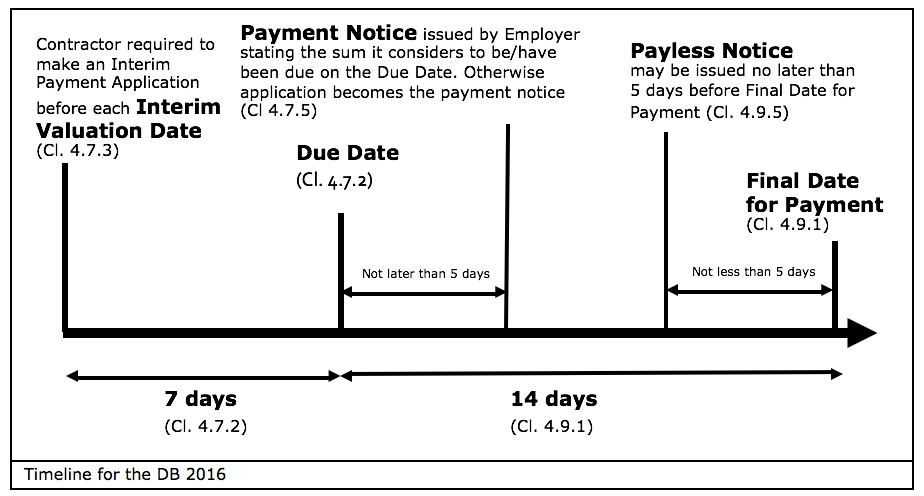Introduction
-
The JCT 2016 Suite of Contracts was introduced three years ago and is now becoming commonplace on projects. The 2016 suite includes some significant revisions. This Article will cover simplification of the payment terms and adjustments to the loss and expense procedures. The overall aim of these changes is to speed up payments.
Payment 1 – The Payment Terms
-
The 2016 Contracts refer to an Interim Valuation Date (“IVD”). The IVD should be set out in the Contract Particulars of the Main Contract. The same IVD should then be included in the Sub-Contracts and Sub-Sub-Contracts so there is a common date throughout the supply chain. This change is influenced by the Government’s Construction Supply Chain Payment Charter which aims to achieve standard payment terms of 30 days. The Due Date then follows the IVD.
-
In the Main Contract the Due Date is 7 days after the IVD.
-
In the Sub-Contracts the Due Date is 12 days after the IVD.
-
In the Sub-Sub-Contracts the Due Date is 17 days after the IVD.
Payment 2 – Payment Timeline
-
The timeline for the Design and Build Contract 2016 (“DB 2016”) is set out below.

-
The timing between the Due Date and the Final Date for Payment has been changed. In 2011 the final date for payment was 28 days after the Due Date. In 2016 this was reduced to 14 days which speeds up payment.
-
In 2011 there was a difference in the timing between payments due before practical completion (monthly) and after practical completion/during the Rectification Period (every 2 months). The 2016 Contracts improve payment terms for Contractors by continuing the monthly payments after practical completion.
Loss and Expense 1 – Application or Notice?
-
In 2011 the position was that a Contractor who wanted to claim loss and expense “may make an application” to the Employer for loss and expense. This has been changed so a Contractor who wants to claim loss and expense “shall notify” the Employer under JCT 2016 (JCT DB 4.19.2).
Loss and Expense 2 – Timing
-
In 2011 an application to the Employer was to be given
“…as soon as it has become, or should reasonably have become, apparent to him that the regular progress has been or is likely to be affected.” (Clause 4.20.1 JCT DB 2011).
-
This period has been reduced so, in 2016, it says notice is to be given
“…as soon as the likely effect of a Relevant Matter on regular progress or the likely nature and extent of any loss and/ or expense arising from a deferment of possession becomes (or should have become) reasonably apparent to him.” (Clause 4.20.1 JCT DB 2016).
-
The 2016 Contracts also say the Contractor
“shall, subject to…compliance with the [notice/ initial assessment provisions] be entitled to reimbursement of that loss and/or expense.” (Clause 4.19.1 JCT DB 2016).
Along with the notification obligations in Clause 4.20.1 JCT DB 2016 this arguably creates a Condition Precedent which means that, if the Contractor does not give notice or provide the requirement information promptly, it could lose entitlement. It is crucial that the contractual procedures are followed.
Loss and Expense 3 – Supply of Information
-
In 2011 the Contractor was to supply information “on request” (Clause 4.20.2 JCT DB 2011) any information required for its loss and expense assessment. The Contractor should now provide their initial assessment of loss and expense either with the notification or as soon as reasonably practicable (Clause 4.20.1 DB 2016).
-
There is also a requirement for the Contractor to provide monthly updates whether they are requested or not. Information should continue to be provided
“until all information reasonably necessary to allow ascertainment of the total amount of such loss and expense has been supplied” (Clause 4.20.3 JCT DB 2016).
Loss and Expense 4 – Time for Assessment
-
In 2011 there was no time limit on the Contract Administrator/Architect (SBC) and the Employer (DBC) assessing claims.
-
In 2016 the initial claim must be assessed within 28 days of receipt and within 14 days of any subsequent update (Clause 4.20.4 JCT DB 2016). The intention is clearly to avoid claims and disputes being left until the end of the project.
Conclusions
-
The revisions to the JCT Suite of Contracts aims to improve the speed of payments but, of course, the payment timescales are likely to be amended by Employers/Contractors and (further down the contractual chain) companies own standard terms and conditions and payment timings are likely to continue to be used.
-
The revisions introduce some potential pitfalls that could prevent the recovery of loss and expense. It is vital that project teams understand and are familiar with the changes.
-
Sheffield
The Annexe,
260 Ecclesall Road South,
Ecclesall,
Sheffield,
S11 9PSTel - 0114 230 1329
-
London
Adam House,
7-10 Adam Street,
London,
WC2N 6AATel – 020 7520 9295
-
Leeds
Suite 69,
4100 Park Approach,
Thorpe Park,
Leeds,
LS15 8GBTel - 0113 397 0358
-
Warrington
Suite 41,
Lakeview 600,
Lakeside Drive,
Centre Park Square,
Warrington,
WA1 1RWTel - 01925 984705
-
Manchester
3 Hardman Street,
Manchester,
M3 3HFTel - 0114 230 1329
-
Birmingham
Birmingham Business Park,
4200 Waterside Centre,
Solihull Parkway,
Birmingham,
B37 7YNTel - 0121 481 2381
-
Liverpool
Horton House,
Exchange Flags,
Liverpool,
L2 3PFTel - 07753 837149
